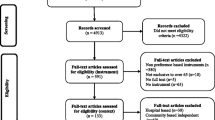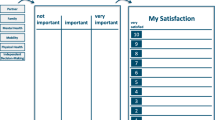Abstract
This study estimates quality-adjusted life-year (QALY) weights for relatives caring for an older person. The data used are from the Swedish part of the EUROFAMCARE study. A new measure is introduced called the R-QALY weight, defined as the effect on a relative’s QALY weight due to being a relative of a disabled or sick individual. R-QALY weights were created by comparing relatives’ QALY weights with population-based QALY weights. They were also created by comparing with QALY weights reassessed for a hypothetical situation in which the older person needed no care. The results indicate that R-QALY weights are small when compared with population-based weights, but large when compared with QALY weights reassessed for the hypothetical situation. Moreover, R-QALY weights were affected by relatives’ age, sex, and subjective perception of positive and negative aspects of the caregiving situation. These aspects should therefore be taken into account in health economics evaluations using a societal approach.
Similar content being viewed by others
References
Gold, M.R., Siegel, J.E., Russel, L.B., Weinstein, M.C.: Cost-effectiveness in health, medicine. Oxford University Press, New York (1996)
Drummond, M.F., O’Brian, B., Stoddart, G.L., Torrance, G.W.: Methods for the economic evaluation of health care programmes. 2nd edn. Oxford University Press, New York (1997)
Torrance, G.W., Siegel, J.E., Luce, B.R.: Framing, designing the cost-effectiveness analysis. In: Gold, M.R., Siegel, J.E., Russel, L.B., Weinstein, M.C. (eds.) Cost-effectiveness in health and medicine. Oxford University Press, NewYork (1996)
Basu, A., Meltzer, D.: Implications of spillover effects within the family for medical cost-effectiveness analysis. J. Health Econ. 24, 751–773 (2005)
Brouwer, W., Van Exel, N., Van Gorp, B., Redekop, W.: The CarerQol instrument: a new instrument to measure care-related quality of life of informal caregivers for use in economic evaluations. Qual. Life Res. 15, 1005–1021 (2006)
Dixon, S., Walker, M., Salek, S.: Incorporating carer effects into economic evaluation. Pharmacoeconomics 24, 43–53 (2006)
Mohide, E.A., Torrance, G.W., Streiner, D.L., Pringle, D.M., Gilbert, J.R.: Measuring the wellbeing of family caregivers using the time trade-off technique. J. Clin. Epidemiol. 41, 475–482 (1988)
Brouwer, W.B., Van Exel, N.J.A., Koopmanschap, M.A., Rutten, F.F.H.: The valuation of informal care in economic appraisal. A consideration of individual choice and societal costs of time. Int. J. Technol. Assess. Health Care 15, 147–160 (1999)
Sundström, G., Johansson, L., Hassing, L.: The shifting balance of long-term care in Sweden. Gerontologist 42, 350–355 (2002)
Khaw, K.T.: How many, how old, how soon? BMJ 319, 1350–1352 (1999)
Kristensson Ekwall, A.: Informal caregiving at old age—content, coping difficulties and satisfaction, PhD dissertation, Lund University (2004)
Stolz, P., Udén, G., Willman, A.: Support for family carers who care for an elderly person at home—systematic review. Scand. J. Caring Sci. 18, 111–119 (2004)
Schulz, R., Martire, L.M.: Family caregiving of persons with dementia. Am. J. Geriatr. Psychiatry 12, 240–249 (2004)
Whitlatch, C.J.: Distress and burden for family caregivers. In: Wimo, A., Jönsson, B., Karlsson, G., Winblad, B. (eds.) Health Economics of Dementia. Wiley, Chichester (1998)
Argimon, J.M., Limon, E., Vila, J., Cabezas, C.: Health-related quality of life in carers of patients with dementia. Fam. Pract. 21, 454–457 (2004)
Aneshensel, C.S., Pearlin, L.I., Schuler, R.H.: Stress, role captivity, and the cessation of caregiving. J. Health Soc. Behav. 34, 54–70 (1993)
White, C.L., Lauzon, S., Yaffe, M.J.: Wood-Dauphinee, S. Toward a model of quality of life for family caregivers of stroke survivors. Qual. Life Res. 13, 625–638 (2004)
EUROFAMCARE Services for supporting family carers of elderly people in Europe: characteristics, coverage and usage. Available from: http://www.uke.uni-hamburg.de/extern/eurofamcare (Accessed 28 Sept. 2006)
Brooks, R.: EuroQol: the current state of play. Health Policy 37, 53–72 (1996)
Dolan, P.: Modeling valuations for EuroQol health states. Med. Care 35, 1095–1098 (1997)
Burström, K., Johannesson, M., Diderichsen, F.: Swedish population health-related quality of life results using the EQ-5D. Qual. Life Res. 10, 621–635 (2001)
McKee, K.J., Philp, I., Lamura, G., et al.: The COPE Index: a first stage assessment of negative impact, positive value and quality of support of caregiving in informal carers of older people. Aging Ment. Health 7, 39–52 (2003)
McKee, K., Balducci, C., Krevers, B. et.al. TEUSURE Chapter 3: The EUROFAMCARE common assessment tool (CAT): item and scale development and description. In: Doehner, H. Kofahl, C. (eds.) Supporting Services for Family Carers of Older People in Europe: Trans-European Report of the 6-country EUROFAMCARE survey, Hamburg University (2006)
Brouwer, W.B., Van Exel, N.J.A., Van den Berg, B., et al.: Burden of caregiving: evidence of objective burden, subjective burden, and quality of life impacts on informal caregivers of patients with rheumatoid arthritis. Arthritis Rheum. 51, 570–577 (2004)
Mulvaney-Day, N.E.: Using willingness to pay to measure family members’ preferences in mental health. J. Ment. Health Policy Econ. 8, 71–81 (2005)
Donaldson, C., Tarrier, N., Burns, A.: Determinants of carer stress in Alzheimer’s disease. Int. J. Geriatr. Psychiatry 13, 248–256 (1998)
Öberg, B., Quattrini, S., Brown, J.,et.al.: TEUSURE Chapter 4: Sampling, recruitment and representativeness. In: Doehner, H., Kofahl, C. (eds.) Supporting Services for Family Carers of Older People in Europe: Trans-European Report of the 6-country EUROFAMCARE survey, Hamburg University (2006)
Rajagopalan, K., Abetz, L., Mertzanis, P., et al.: Comparing the discriminative validity of two generic and one disease-specific health-related quality of life measures in a sample of patients with dry eye. Value Health 8, 168–174 (2005)
Brouwer, W.B., Van Exel, N.J.A., Van den Berg, B., Van den Bos, G.A.M., Koopmanschap, M.A.: Process utility from providing informal care: the benefit of caring. Health Policy 74, 85–99 (2005)
Hawthorne, G.: The effect of different methods of collecting data: mail, telephone and filter data collection issues in utility measurement. Qual. Life Res. 12, 1081–1088 (2003)
Arrow, K.A.: Difficulty in the concept of social welfare. J. Polit. Econ. 58, 328–346 (1950)
Acknowledgments
This project is supported by the European Union in the 5th Framework Programme: Quality of Life and Management of Living Resources—Key action 6: The Ageing Population and Disabilities. 6.5: Health and Social Care Services to Older People (Contract: QLK6-CT-2002-02647) and a grant from the Östergötland county council, Sweden.
Author information
Authors and Affiliations
Corresponding author
Rights and permissions
About this article
Cite this article
Davidson, T., Krevers, B. & Levin, LÅ. In pursuit of QALY weights for relatives: empirical estimates in relatives caring for older people. Eur J Health Econ 9, 285–292 (2008). https://doi.org/10.1007/s10198-007-0076-z
Received:
Accepted:
Published:
Issue Date:
DOI: https://doi.org/10.1007/s10198-007-0076-z




